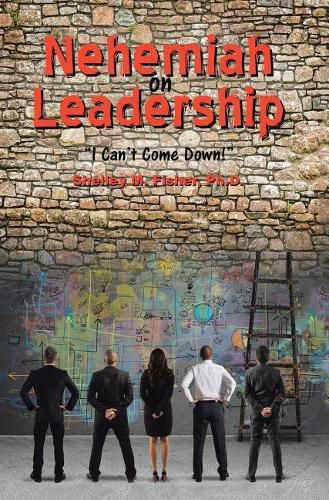Readings Newsletter
Become a Readings Member to make your shopping experience even easier.
Sign in or sign up for free!
You’re not far away from qualifying for FREE standard shipping within Australia
You’ve qualified for FREE standard shipping within Australia
The cart is loading…






This title is printed to order. This book may have been self-published. If so, we cannot guarantee the quality of the content. In the main most books will have gone through the editing process however some may not. We therefore suggest that you be aware of this before ordering this book. If in doubt check either the author or publisher’s details as we are unable to accept any returns unless they are faulty. Please contact us if you have any questions.
In a time when leadership seems to be in the throes of despair, Nehemiah’s leadership journey is refreshing. At the onset of the book that bears his name he is serving, exemplary leaders serve. The book depicts the ethical dimensions of leadership, as Nehemiah shows compassion for the plight of his people because the walls were down, putting them in imminent danger. We learn that effective leaders do not compromise their values, and they confront improprieties both within and outside of the organization.
Nehemiah displayed many attributes of an effective leader–risk-taker, for example. The law of the land forbade a person from going before the king with a sad countenance; however, Nehemiah, the risk-taker, prayed and received favor from the king despite his sad countenance. In surmounting the challenge of rebuilding the walls, he demonstrates the role of the administrator by:
Praying; Planning; Goal-setting and strategizing; Using excellent communication skills; Team building; and Mediating conflict.
Nehemiah demonstrates how to deal with conflict. Since conflict is inevitable, it is important for leaders to know how to resolve it. I Can’t Come Down displays Nehemiah’s focus and perseverance on the task.
He shows how to structure tasks with diverse groups–mayors, priests, people of all backgrounds, including women–worked collectively to accomplish the completion of the walls in fifty-two days.
The ageless principles of leadership comingle with contemporary organizational theory. Albert Bandura highlights agency, self-efficacy, collective and leadership efficacy as key factors in motivation. Organizational theorists view leaders today through the five lenses of motivation, communication, politics, structure, and design.
Finally, the reader is challenged to become proactive in his own community by participation, persuasion, and prayer. The concept of positive deviance is suggested as viable for solving problems in neighborhoods. It is a misnomer to think in terms of sacred and secular, for God is Creator of everything.
$9.00 standard shipping within Australia
FREE standard shipping within Australia for orders over $100.00
Express & International shipping calculated at checkout
This title is printed to order. This book may have been self-published. If so, we cannot guarantee the quality of the content. In the main most books will have gone through the editing process however some may not. We therefore suggest that you be aware of this before ordering this book. If in doubt check either the author or publisher’s details as we are unable to accept any returns unless they are faulty. Please contact us if you have any questions.
In a time when leadership seems to be in the throes of despair, Nehemiah’s leadership journey is refreshing. At the onset of the book that bears his name he is serving, exemplary leaders serve. The book depicts the ethical dimensions of leadership, as Nehemiah shows compassion for the plight of his people because the walls were down, putting them in imminent danger. We learn that effective leaders do not compromise their values, and they confront improprieties both within and outside of the organization.
Nehemiah displayed many attributes of an effective leader–risk-taker, for example. The law of the land forbade a person from going before the king with a sad countenance; however, Nehemiah, the risk-taker, prayed and received favor from the king despite his sad countenance. In surmounting the challenge of rebuilding the walls, he demonstrates the role of the administrator by:
Praying; Planning; Goal-setting and strategizing; Using excellent communication skills; Team building; and Mediating conflict.
Nehemiah demonstrates how to deal with conflict. Since conflict is inevitable, it is important for leaders to know how to resolve it. I Can’t Come Down displays Nehemiah’s focus and perseverance on the task.
He shows how to structure tasks with diverse groups–mayors, priests, people of all backgrounds, including women–worked collectively to accomplish the completion of the walls in fifty-two days.
The ageless principles of leadership comingle with contemporary organizational theory. Albert Bandura highlights agency, self-efficacy, collective and leadership efficacy as key factors in motivation. Organizational theorists view leaders today through the five lenses of motivation, communication, politics, structure, and design.
Finally, the reader is challenged to become proactive in his own community by participation, persuasion, and prayer. The concept of positive deviance is suggested as viable for solving problems in neighborhoods. It is a misnomer to think in terms of sacred and secular, for God is Creator of everything.